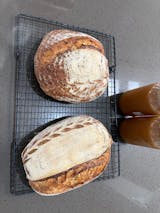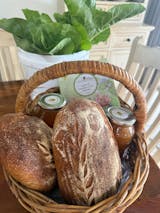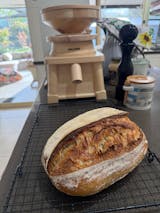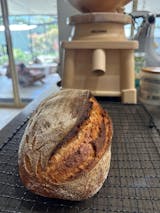

This Khorasan grain is grown by Julie and Geoff Brown of Bio-Oz; a family-run business in central New South Wales focused on regeneratively growing heritage grains. The Browns are also the founders of the Sustainable Farmers of Australia initiative, which supports transparency, sustainability, and long-term soil health across Australian agriculture.
Khorasan (also known by the trademarked name Kamut®) is an ancient wheat variety known for its large golden kernels, buttery flavour, and easy digestibility. It’s naturally higher in protein than modern wheats and mills into a rich, slightly sweet flour that performs beautifully in breads, flatbreads, and wholegrain baking.
You can read more about khorasan wheat, including its farming and baking characteristics, in our article here.
Why we love it:
-
Grown by Bio-Oz in central NSW (Julie & Geoff Brown)
-
Sustainably farmed and traceable back to the grower
-
Large golden kernels – ideal for milling and baking
-
Excellent flavour and digestibility
-
Ancient wheat species – non-hybridised and nutrient-dense
About Khorasan grain:
Khorasan is a tetraploid ancient wheat (Triticum turanicum), genetically distinct from modern bread wheats. Its long, plump grains contain more protein and minerals, and its mild, nutty flavour makes it a favourite among wholegrain bakers and those looking for an alternative to modern wheat.
Often well tolerated by people sensitive to conventional wheat (though not gluten-free), it’s valued for its digestibility, traditional roots, and flavour. We talk a bit about gluten and the differences in modern and ancient grain in our blog post about gluten
About the growers:
Julie and Geoff Brown are pioneers in Australian heritage grain production. Through Bio-Oz and their Sustainable Farmers of Australia initiative, they champion low-input, farmer-led grain growing; prioritising soil health, regional food security, and seed sovereignty. Their Khorasan is fully traceable from paddock to plate, and grown with care for people and planet.
Learn more about Bio-Oz.
FAQs
How would you describe Khorasan?
Khorasan has a mild, buttery flavour with a slightly chewy texture when cooked whole. Milled into flour, it produces a very soft flour that produces golden loaves and pastries with a natural sweetness.
Can I use khorasan for sourdough or bread?
Yes. Khorasan performs well in sourdough, yeasted loaves, and flatbreads. It has good strength, but the gluten behaves differently to modern wheat. Expect a slightly softer dough and crust with excellent flavour. For a loaf that you may be more familiar with try blending in a true wheat. Here is a great recipe for a mixed grain loaf
Can I mill khorasan grain at home?
Absolutely. Khorasan is ideal for home milling, producing a rich, creamy flour perfect for fresh baking.
Is khorasan gluten-free?
No. Khorasan does contain gluten. However, many people who find modern wheat difficult to digest tolerate Khorasan more easily due to its more simple chromosomal structure (as a tetraploid) . We have written a blog post about the intricacies of gluten in different grains. You can read about it here.
How should I cook khorasan grain whole?
Soak overnight, then simmer until tender (roughly 45–60 mins). Great in grain salads, bowls, or as a rice substitute.
How should I store grains?
Keep in an airtight container in a cool, dry spot. For long-term storage, refrigerate or freeze to protect from pests. For more tips, have a look at our "managing pests" page
Product packed by the producer in a multi-walled paper bag.
Weight:
Dimensions: x x
Product contains Gluten
Growing Methods:







